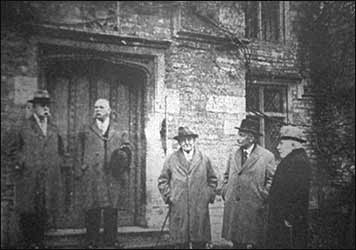|
The Rushden Echo and Argus, 30th December, 1932
Rushden Museum Opened - Boxing Day Ceremony
Town as “Residential Centre”
Rushden Hall Museum, on which a descriptive article appeared in last week’s issue of the “Echo and Argus,” was formally opened to the public on Monday afternoon, by Councillor G. W. Coles, J.P., chairman of the Parks, Baths, and Hall Committee of the Rushden Urban Council.
 |
|
Outside the Hall
|
About 30 people were present at the ceremony at 2 o’clock, outside the Hall and Councillor John Spencer, J.P., presided, in the absence of the chairman of the Council, Mr. J. Roe, J.P., who was away from the town.
Others present included Councillors C. W. Horrell, C.A., A. Wilmott, J. Hornsby, and J. T. Richardson, with Mr. H. Lack (Rates Clerk), and Mr. F. S. F. Piper (Sanitary Inspector).
Mr. Spencer said his recollections of Rushden went back for nearly half a century to the time when Rushden was a comparatively small village without proper streets, pavement or roads; no proper sanitary arrangements, without a good water supply and with no recreation ground or Council buildings. At that time they had the Green, and very little else.
Since then Rushden had developed by leaps and bounds, and to-day they had the best sewerage system, water supply, roads and pavements. They also had recreation grounds where young and old could have pleasure, and last, but not least, they had quite recently secured the wonderful Hall and grounds. They hoped that the spirit which had been at work – the spirit of progress – would still continue.
“The Day”
Mr. Spencer added that Mr. Coles had done a lot of work in connection with the development of the Hall. The Council had decided not to be in a hurry in developing the estate, but schemes would be formulated whereby the Hall would be made useful, not only for the present generation, but for those to come.
Mr. Coles said to-day was for him a great one to which he had been looking forward for a considerable time.
When they were fortunate enough to secure the Hall and grounds he felt so lifted up that he made this statement:- “Up to now Rushden has been a purely industrial town, but acquiring the grounds has given it a much higher tone and improved it from an industrial centre to a residential centre.” He did not know a town in the county that had a better park.
“It was felt that we should make some good use of a large Hall of this character,” continued Mr. Coles, “and there is no better use that I can think of than as a museum and art gallery.
“In answering our appeals for articles of local and national interest our Rushden friends have been exceedingly kind, and I think you will agree that we have made an excellent start. It is a small collection, but we are not done yet, and we hope to make use of other rooms for a similar purpose.”
Aid From Northampton
Mr. Coles appealed to the townspeople to give or lend further exhibits, and expressed the hope that the museum would prove an attraction to Rushden and district people. He hoped that even the juveniles would make use of it, because there was always an educational value attached to a museum.
They were greatly indebted to Mr. Brown, the curator of the Northampton Museums, who had placed his great experience at their disposal and had also been good enough to send over a few exhibits from Northampton and to promise that they could call upon his museum for further loans.
Before declaring the museum open Mr. Coles thanked Councillors Spencer and Wilmott, who, with himself had formed a sub-committee and gone heart and soul into the matter.
Proposing a vote of thanks to the opener, Mr. Wilmott, in one of his humorous speeches, said Mr. Coles had sacrificed much time in what had been a rather tedious job. After expressing his confidence that the public would appreciate “the little museum,” Mr. Wilmott mentioned that articles for exhibition could be borrowed from the British Museum and South Kensington Museum.
Mr. Horrell seconded and the ceremony then ended.
The visitors then inspected the museum. Candles were lighted in a Venetian glass candelabra, and throughout the afternoon members of the Council were explaining the exhibits to interested questioners.
|